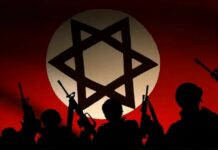
The First Amendment to the Constitution states that, “Congress shall make no law” prohibiting “the right of the people peaceably to assemble.” The word peaceable means “inclined to avoid argument or violent conflict” or “free of argument or conflict; peaceful,” according to Google definitions from Oxford Languages.
The anti-Israel protesters at the University of Pennsylvania, Haverford College and other campuses locally and nationally are assembling in encampments…just not peaceably.
They have blocked access to buildings, threatened Jewish students, chanted “kill the Jews,” written antisemitic graffiti on statues and thrown off graduation schedules.
There is no First Amendment right to do any of that.
University administrators locally and nationally are starting to take action.
At Penn, Interim President J. Larry Jameson ordered the protesters to disband. At Swarthmore College, acting Co-Presidents Tomoko Sakomura and Rob Goldberg promised to “take immediate steps to secure the safety of our community,” according to a statement. And at Princeton University, 11 students were arrested, according to The Philadelphia Inquirer.
Nationally, Columbia University, the University of Texas at Austin and others have threatened discipline, including suspensions, to students who refuse to disperse. And yet, at Columbia at least, students responded by occupying a school building. The Penn encampment is now in day six.
“After many efforts to engage the protesters, the interim president and provost met with several student and faculty protesters Saturday night to hear their concerns. They reiterated to the protesters the importance of complying with Penn’s policies, which are designed to support open expression, while ensuring the safety of all on our campus,” read a statement from Penn.
Protests are ongoing at many schools.
University administrators have begun taking a harsher stance — and even harsher action in some cases — such as Columbia’s president calling in the police, since December congressional hearings about antisemitism on college campuses led to the resignations of presidents at two of America’s elite universities: Penn (M. Elizabeth Magill) and Harvard University (Claudine Gay). They have also gotten tougher during graduation season when many families descend on campuses for ceremonies.
Rabbi Gil Steinlauf, the executive director of the Princeton Center for Jewish Life, recommends his university’s approach.

In a note to parents and alums, he explained that there is only a sit-in at a courtyard, not an encampment. He also said that the “rhetoric and activities of some of the protesters are hateful toward Israel and disturbing for many to experience.” Steinlauf further explained that the protests “are largely run by a small group of graduate students, professors and outside actors.”
While the rabbi said many members of the Jewish community were “horrified,” he credited the university with keeping the situation under control. University administrators have communicated to Steinlauf that “they are watching all the protestors closely for any acts that move from rhetoric to direct threats.”
“The administration and public safety are giving this situation serious, ongoing attention to prevent the more intense, disruptive and frightening activities we see elsewhere,” he wrote. “The university has made it clear that there are lines that may not be crossed, and that protests may not degenerate into incivility and unrest.”
Princeton public safety officers are “monitoring the location,” according to Steinlauf. Princeton’s president, Christopher L. Eisgruber, and vice president of campus life, Rochelle Calhoun, issued strong statements against encampments. Eisgruber has also stated that he is against academic boycotts of Israel.
At the CJL, students expressed concern to Steinlauf at the intensity of the chants and at the raising of a Hezbollah flag. At the same time, the majority of students told Steinlauf they are “not living in fear.”
Princeton professors and administrators have formed a “Jewish Experience Working Group.” The group is convening “confidential focus groups” to “listen to the experiences of Jewish members of the campus community.” Its goal is to “develop plans to meet the needs of the Jewish community during these challenging times.”
More than 400 students attended a “Unity Shabbat” last weekend organized by the CJL and the campus Chabad house. More than 100 gathered for four seders over the first two days of Passover. The CJL “provided resources for ‘home-hosted’ seders led by students.”
Students have also gathered at the CJL to take snack breaks, discuss the protests and work on responses such as op-eds, according to Steinlauf.
“Jewish students are continuing to be in community with one another, knowing that it’s not just the CJL and Chabad, but the university itself that sees them and supports them and wants them to be strong and proud to speak up and to live openly and unafraid as Jews on our campus,” the rabbi wrote.






